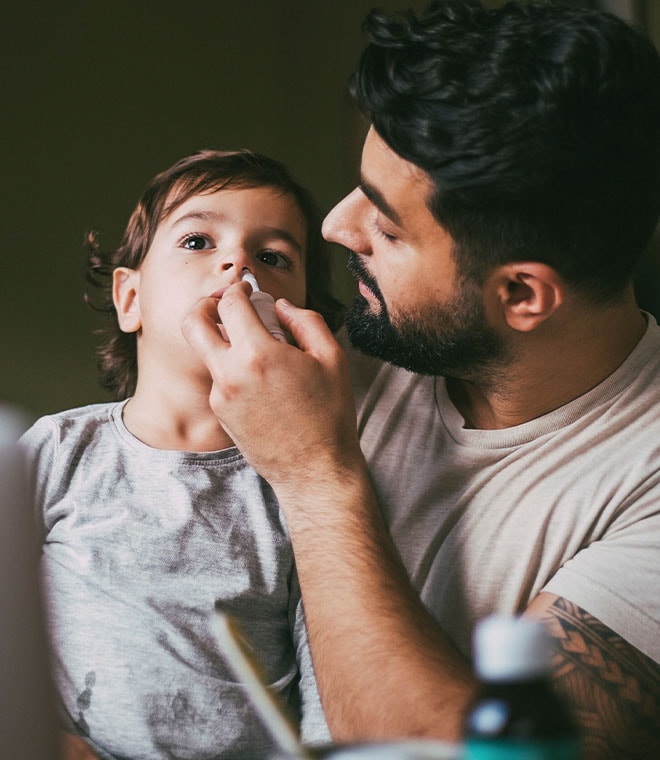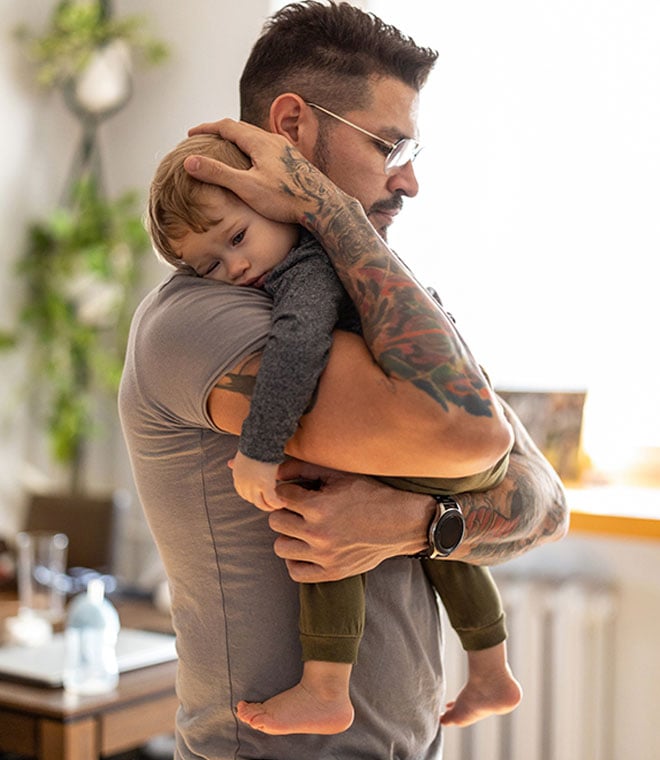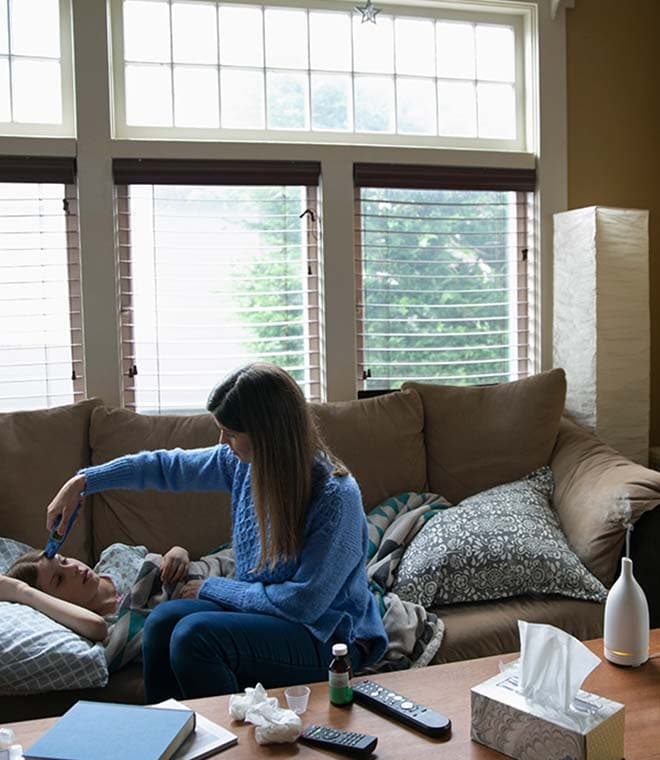Health
Cough and cold medicine for children: What are the options?
By Dennis Galvon, MD Oct 25, 2023 • 8 min
Colds are caused by viruses, and they’re common in children. Children can have six to eight colds per year, which cause symptoms like sneezing, coughing and runny nose. These symptoms typically resolve in seven days or less, but they can make your child miserable during the recovery period. While prescription medications are rarely needed for a cold, you’ll find a bewildering array of over-the-counter cold and cough syrups and tablets for children.
Types of over-the-counter congestion medicines for children
There are no over-the-counter cough and cold medicines approved by the U.S. Food and Drug Administration (FDA) for children under the age of 2, and some ingredients are not recommended for use in children under the age of 4. It’s best to ask your healthcare provider about giving cold medicine to children age 6 and under. Most formulas contain one or more of the following medications:
- Decongestants: These temporarily dry out and constrict mucous membranes. They also help relieve symptoms of a runny or stuffy nose. They’re stimulants, so they may interfere with sleep. Commonly used decongestants include pseudoephedrine and phenylephrine.
- Antihistamines: These are generally used to reduce allergy symptoms but are often added to children’s cold medications to relieve runny nose, sneezing and itchy eyes. Some of these products also promote drowsiness and sleep, although they may have stimulating effects on some children. The most common antihistamines used in cold medications are diphenhydramine, loratadine, cetirizine and fexofenadine.
Cough syrups for kids
Coughing is a common cold symptom. Coughing offers a protective effect to keep the throat and upper airway clear, but prolonged coughing is irritating and exhausting for children. Cough suppressant medications can help temporarily relieve a cough by interfering with the body’s cough reflex. Dextromethorphan is the active ingredient in most cough syrups. Some contain guaifenesin, an expectorant or mucous thinner, that helps to loosen chest congestion and make coughs more productive. Prescription cough syrups containing codeine should never be given to children. Speak with your healthcare provider before giving your child cough syrup or tablets.
Pain and fever medications for kids
When your child comes down with a cold, their immune system activates to fight off the infection, and their body temperature may rise, leading to a fever. A low-grade temperature below 102 degrees Fahrenheit in kids with colds is common and not usually a cause for concern. Contact your healthcare provider if your child is 3 months or younger and has a fever of 100.4 degrees Fahrenheit or higher.
Fever can cause discomfort, which usually improves with an increase in fluids, including water, juice, soup and popsicles. Acetaminophen (Tylenol) and ibuprofen (Advil and Motrin) are both available in children’s strengths. Avoid ibuprofen for infants younger than 6 months of age, and never give aspirin to a child.
Combination cold and cough medicine for kids
Medications that combine two or more ingredients are common for cold symptom relief. Depending on the formula, these products may contain a cough suppressant, a decongestant and/or a fever reducer, allowing them to address multiple symptoms. Talk to your healthcare provider before using these medications, since it’s difficult to predict what side effects your child may experience.
Tips for giving cold and cough medicine to children
Using over-the-counter cough and cold medications as directed is important for your child’s safety and well-being. Keep the following tips in mind for best results:
Talk to your healthcare provider first
Before giving your child any over-the-counter medication for cold symptoms, check with your healthcare provider. Typically, healthcare providers advise against cold or cough medicine for an infant or child younger than 6.
Follow dosing instructions
Over-the-counter medications come with directions for use that tell you how much to give your child and how frequently you can administer the medication. Follow these instructions closely unless your healthcare provider tells you otherwise.
Measure medications carefully
Liquid and drop medications are often easier to give to children than tablets and capsules, but they require careful measuring. Use the cup, syringe or dropper that comes with the medication, and double-check your measurements to ensure that your child gets the correct amount.
Keep an eye out for symptoms and side effects
Although you don’t need a prescription to purchase them, over-the-counter medications can cause side effects. Read the warning labels on the packaging, and be on the lookout for any serious side effects listed. If your child experiences side effects, seek prompt medical attention.
Most colds begin to improve within a few days to a week. Complications, such as ear, sinus or lung infections, are possible if your child’s symptoms last 10 days or more. If you observe any of the following symptoms in your child, contact your healthcare provider:
- Fever of 100.4 degrees Fahrenheit or more in a child under the age of 3 months
- Blue lips
- Difficulty breathing as indicated by wheezing, flaring nostrils, fast breathing and/or shortness of breath
- Severe headache
- Decreased urination
- Refusal to eat or drink
- Persistent ear pain
- Excessive sleepiness
- Any severe worsening of symptoms
Use home remedies along with cold medications
Many healthcare providers suggest parents use at-home remedies as the first line of treatment for a child with a cold, and you can use them in conjunction with cold medications. Consider the following tips:
- For children 1 year or older, dissolve a couple of tablespoons of honey in warm water to soothe a sore throat and reduce cough.
- Try salt water (saline) nasal sprays for nasal congestion. No prescription is needed, and they’re safe for all ages. These are different from nasal decongestant sprays, which may make symptoms worse.
- Use an infant nasal bulb with saline spray to clear out mucus from the nose.
- Set up a cool mist humidifier in your child’s room at night to make breathing easier.
Updated October 2023.
Sources:
- https://kidshealth.org/en/parents/cold.html
- https://my.clevelandclinic.org/health/diseases/12342-common-cold
- https://www.urmc.rochester.edu/encyclopedia/content.aspx?contenttypeid=90&contentid=P02966
- https://familydoctor.org/cough-medicine-understanding-your-otc-options/
- https://familydoctor.org/decongestants-otc-relief-for-congestion/
- https://www.medlineplus.gov/druginfo/meds/a682539.html
- https://www.urmc.rochester.edu/encyclopedia/content.aspx?contenttypeid=56&contentid=2432
- https://www.fda.gov/consumers/consumer-updates/should-you-give-kids-medicine-coughs-and-colds
- https://www.healthychildren.org/English/health-issues/conditions/chest-lungs/Pages/Coughs-and-Colds-Medicines-or-Home-Remedies.aspx
- https://www.mayoclinic.org/healthy-lifestyle/childrens-health/in-depth/cold-medicines/art-20047855
- https://familydoctor.org/otc-cough-and-cold-medicines-and-my-child/
- https://www.healthychildren.org/English/health-issues/conditions/ear-nose-throat/Pages/Children-and-Colds.aspx


